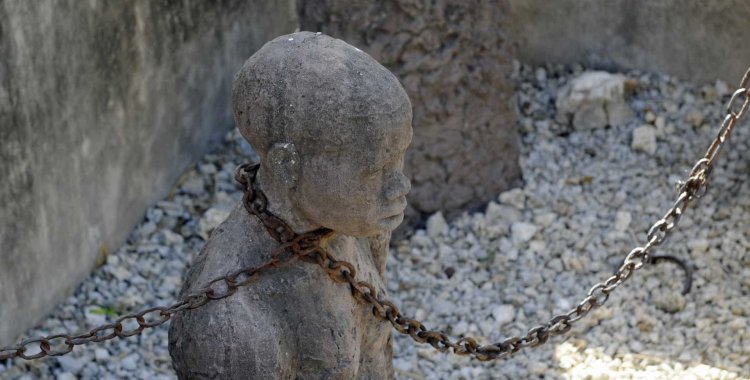"The last time an ancestor of mine smuggled slaves from Angola to Brazil was not that long ago, it was in 1846", said Catarina Demony, in an interview with Lusa agency, regarding a documentary she is preparing on this topic, starting from the reality of your family.
A journalist by profession, Catarina Demony has always wondered about the origin of her family's "money" and "privileges". Maternal grandparents were born in Angola, where they had "a good life", and came to Portugal after the 25th of April.
One day the doubt was clarified: "I was talking to my grandmother and she said exactly that. So, but you didn't know that our ancestors, from your mother [Catherine's grandmother], were slave traders in Angola, great slave traders? And I said no, I really didn't know."
Catarina's great-great-grandfather was the last member of the family to work in the slave trade business. He was still "lucky" to meet his great-great-grandmother, however deceased, over 100 years old, with whom she never broached this topic.
Now 28 years old, she was ten years younger when confronted with this fact and has since been looking for documents to find out more about the matter, having decided to make public the history of her family and that of other young people.
The difficulty in obtaining documents has been constant, but one of them revealed that, in the last transport carried out by members of his family, in 1846, the slaves went from a port in Luanda to a port in Brazil.
"Interestingly, this last document shows that it was already a crime. This family member of mine, who took the slaves in 1846, was already going against the law and was tried in Luanda for it," she said, adding that "he was called to court" and that, most likely, "nothing happened."
Although Portugal was a pioneer in the abolition of the slave trade in the metropolis, in 1761, it continued to be possible in the territories. In 1836, a decree was issued prohibiting the "export of slaves, either by sea or by land, in all Portuguese domains, without exception, whether they were located north or south of the equator". But slavery in all Portuguese colonies would only be abolished, by law, in 1869.
In her investigation, Catarina Demony discovered that the Slavery Museum in Luanda was an old chapel of her ancestors, where they baptized slaves before going to boats and being sent, in this case to Brazil.
"The business starts with the portuguese, but it reaches a point where the white Portuguese start marrying black women, also from angolan elites. What historians say is that it is almost to facilitate the process. We have some elites in Angola who do the work, dirty business, they fetch the slaves and then sell them to the white Portuguese who, later, take care of the whole business and process to get to Brazil".
The journalist became aware of the notion that prevailed at the time, that the slave trade was "a business like any other".
"At the time, nobody thought they were dealing slaves, they were doing business, they were making money," she said.
One of the reasons that led Catarina Demony to move forward, now, to this documentary, is to be able to count on the participation of family members.
"My great-grandmother, daughter of my great-great-grandmother [great-granddaughter of the last slave trader family member] is also heading towards 100 and, although she may not have any idea what this means of slavery, she is one of the only people who still benefited a lot from money that came from the slave trade for my family," he said.
"Almost closed" for a long time, the subject will be the subject of a documentary that aims to "start a conversation in Portugal about the subject (...), whether at large events or at the café. Talking about these subjects is what first step to resolve them".
She considers that "this talk of slavery should start a debate in Portugal", but not from the perspective of shame. "With shame, people feel a bit more embarrassed."
"I think we journalists literally spend our lives telling other people's stories. That's our life, telling other people's stories without sometimes looking at ourselves and thinking, well, but I have a very interesting story in my family to tell and if I don't tell this story, no one will tell me."
The documentary is advancing, slower because the covid-19 pandemic forced it, but with the support of friends, image professionals, curious about the subject. And with many testimonials from people who speak openly about the subject.
For Catarina, the impact that slavery had on the descendants of slaves hurts much more than the impact on her life. "On the contrary, the reality is that the fact that my family was involved in the slave trade business opened many doors for me as well. I'm not saying that the money is in my grandmother's account or from my parents comes from the slave trade, but it opened doors".
"This slave trade allowed someone to start businesses, it allowed that someone to have a family, it allowed someone to travel, until we came to me. That's why I think this kind of reflection is important. It benefited me, gave me privileges than the greatest part of the people who are descendants of slaves do not have it, and it is not just in Portugal," she said.
The journalist has no doubts that the documentary will provoke many pointed fingers, from the various sides of the story.
"Slavery has an almost direct connection to the racism problems we have today. Therefore, my ancestors and I don't know how many ancestors of Portuguese elite families contributed to today's racism. It would be hypocrisy for me to go to my Twitter or to my Instagram write 'Black Lives Matter' [movement against violence against the black population] and not tell this story."







